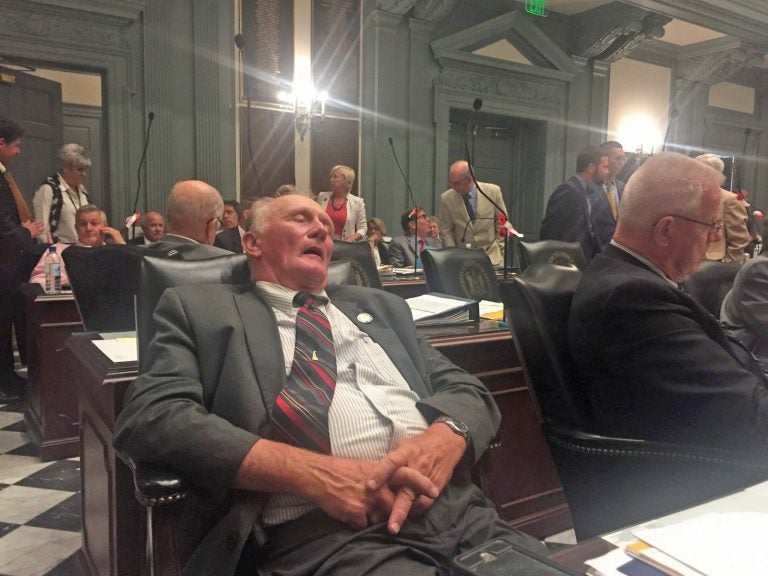Late-night Delaware legislative tradition could soon be a thing of the past
Lawmakers will consider a constitutional amendment to end the need to continue working after midnight on the final day of the legislative session.

State Rep. Dave Wilson takes an understandable snooze during a recess well past sunrise July 1 in the final legislative session in 2018. (Cris Barrish/WHYY)
Every year on June 30, Delaware lawmakers — along with members of the public and press who track what they do — gear up for a late night. Lawmakers have frequently burned the midnight oil and beyond on the final evening of the legislative session, sometimes working into the early hours of the following day.
The tradition stems from the state’s constitution, which requires both chambers to gavel in after midnight if they want to retain their power to call a special session for lawmakers to return to Dover later in the year.
At 4 a.m. on June 30, 2018, House Democrats approved a minimum wage bill which upset Republicans so much, they blocked the state’s $816 million capital spending bill. That set off a series of closed door meetings of bleary-eyed legislators. They finally reached a deal and the session ended at 8 a.m. on July 1.
But this tradition that only a night owl could love may soon be on its way out.
Legislative leadership has introduced a constitutional amendment that would allow the final day’s session to end at 5 p.m. instead of midnight. It would still preserve lawmakers’ ability to call for a special session should the need arise while the legislature is out of session between July and early January.
“For years, we have heard the concerns about these late-night sessions from the public and our fellow legislators alike. While the practice is rooted in the traditions of Legislative Hall, it is far from an ideal way to do the people’s business,” said House Speaker Pete Schwartzkopf of Rehoboth, the bill’s main sponsor. “These marathon session days do not promote transparency in government, and they also result in legislators, staff, and members of the public driving home late at night after a very long day, which is just not safe.”
Schwartzkopf’s fellow Democrat Senate President Pro-Tem David Sokola is also backing the bill, as are Republican leaders in both chambers.
“There is no good purpose served by the General Assembly working legislation late into the night on the last day of the session,” said Republican House Minority Whip Tim Dukes of Laurel. “This reform is long overdue, and I’m glad it appears to have the traction needed to move forward. If successful, it will be a change for the better.”
Constitutional changes require approval from two consecutive sessions of the General Assembly. If it’s approved in the current session which ends June 30 this year, an identical bill must be approved in the next session, which runs from January 2023 to July 2024.
The measure is scheduled for a committee hearing next week.

Get daily updates from WHYY News!
WHYY is your source for fact-based, in-depth journalism and information. As a nonprofit organization, we rely on financial support from readers like you. Please give today.






